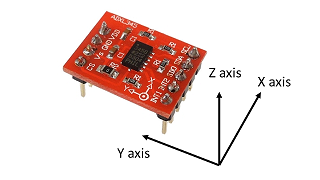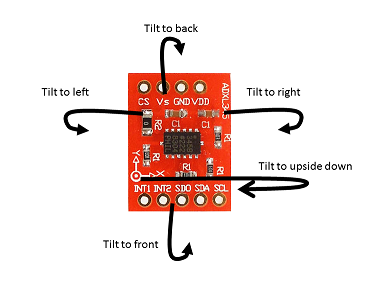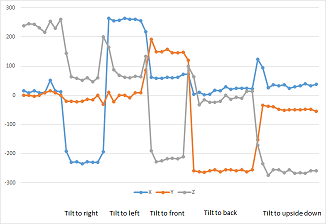ADXL345 3-axis Acceleration Sensor sample
Dependencies: ADXL345_I2C mbed
Fork of ADXL345 by
About ADXL345
ADXL345 is a 3-axis acceleration sensor and can be controlled by using the I2C.
- Datasheet of ADXL345
http://www.analog.com/media/en/technical-documentation/data-sheets/ADXL345.pdf
About sample program
This program outputs the acceleration information of 3-axis to the terminal.
The 3-axis is as follows:

In the graph, the acceleration information of 3-axis showes.


About wiring
| Sensor | GR-PEACH |
| VDD | 3.3V |
| GND | GND |
| SCL | D15 |
| SDA | D14 |
Revision 0:75c7bfd01ea0, committed 2011-03-11
- Comitter:
- jrha
- Date:
- Fri Mar 11 15:54:40 2011 +0000
- Child:
- 1:c835cfa8b41c
- Commit message:
Changed in this revision
| ADXL345_I2C.lib | Show annotated file Show diff for this revision Revisions of this file |
| main.cpp | Show annotated file Show diff for this revision Revisions of this file |
--- /dev/null Thu Jan 01 00:00:00 1970 +0000 +++ b/ADXL345_I2C.lib Fri Mar 11 15:54:40 2011 +0000 @@ -0,0 +1,1 @@ +http://mbed.org/users/nimbusgb/code/ADXL345_I2C/#92fa975dab32
--- /dev/null Thu Jan 01 00:00:00 1970 +0000
+++ b/main.cpp Fri Mar 11 15:54:40 2011 +0000
@@ -0,0 +1,39 @@
+#include "mbed.h"
+#include "ADXL345_I2C.h"
+
+//ADXL345 accelerometer(p5, p6, p7, p8);
+ADXL345_I2C accelerometer(p9, p10);
+Serial pc(USBTX, USBRX);
+
+int main()
+{
+
+ int readings[3] = {0, 0, 0};
+
+ pc.printf("Starting ADXL345 test...\n");
+ pc.printf("Device ID is: 0x%02x\n", accelerometer.getDevId());
+
+ //Go into standby mode to configure the device.
+ accelerometer.setPowerControl(0x00);
+
+ //Full resolution, +/-16g, 4mg/LSB.
+ accelerometer.setDataFormatControl(0x0B);
+
+ //3.2kHz data rate.
+ accelerometer.setDataRate(ADXL345_3200HZ);
+
+ //Measurement mode.
+ accelerometer.setPowerControl(0x08);
+
+ while (1)
+ {
+
+ wait(0.1);
+
+ accelerometer.getOutput(readings);
+
+ //13-bit, sign extended values.
+ pc.printf("%i, %i, %i\n", (int16_t)readings[0], (int16_t)readings[1], (int16_t)readings[2]);
+ }
+
+}
